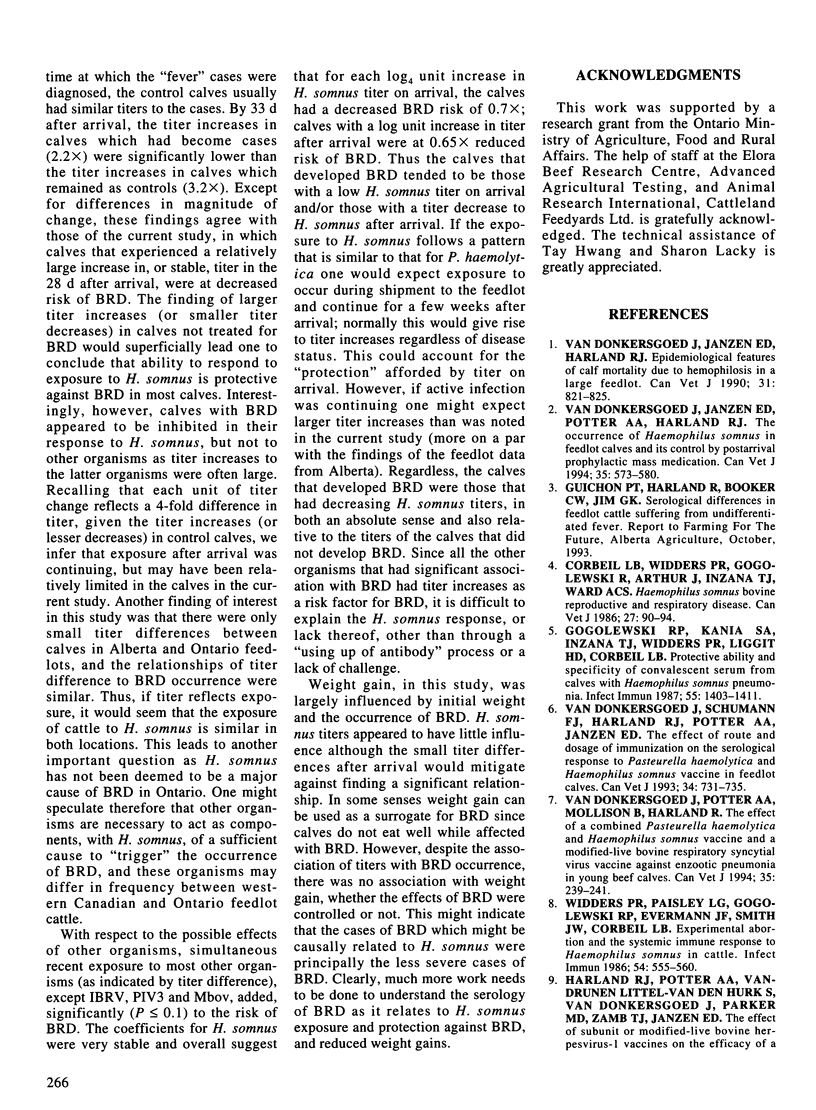Abstract
Serum samples were obtained from 602 calves (from 19 groups in four feedlots: three in Ontario, and one in Alberta) upon arrival at the feedlot and 28 d later. Of these calves, 202 developed bovine respiratory disease (BRD) and 400 did not develop BRD. Based on high antibody titers noted upon arrival, we infer that most calves were exposed to Haemophilus somnus prior to arrival at the feedlot. Within a group, calves with high titers on arrival had a reduced risk of developing BRD later. Most calves did not experience titer increases after arrival; however, calves that had stable or increasing titers had a relatively low risk of contracting BRD. The calves at greatest risk of BRD were those with titers on arrival of less than 6.8 units and subsequent titer decreases of more than 1 unit. The effects of both the titer on arrival and the titer change after arrival were stable when the serologic effects of a number of viruses and Mycoplasma agents were considered. Neither antibody titer on arrival nor titer change was related to weight gain differences among calves. Calves with BRD or calves with lower weight on arrival had decreased weight gains in the first 28-day feeding period. The high titers on arrival may have protected most calves against further infection with H. somnus. However, since the calves that developed BRD had large titer increases to a number of viruses and to Pasteurella haemolytica, while having decreased antibody titers to H. somnus, we infer that the existing antibodies were "used up" in combatting the agents, including H. somnus, which may have "caused" the BRD. Calves which were able to increase their antibody levels to H. somnus tended to have a reduced risk of BRD.
Full text
PDF





Selected References
These references are in PubMed. This may not be the complete list of references from this article.
- Corbeil L. B., Widders P. R., Gogolewski R., Arthur J., Inzana T. J., Ward A. C. Haemophilus somnus: Bovine Reproductive and Respiratory Disease. Can Vet J. 1986 Feb;27(2):90–93. [PMC free article] [PubMed] [Google Scholar]
- Gogolewski R. P., Kania S. A., Inzana T. J., Widders P. R., Liggitt H. D., Corbeil L. B. Protective ability and specificity of convalescent serum from calves with Haemophilus somnus pneumonia. Infect Immun. 1987 Jun;55(6):1403–1411. doi: 10.1128/iai.55.6.1403-1411.1987. [DOI] [PMC free article] [PubMed] [Google Scholar]
- Harland R. J., Potter A. A., van Drunen-Littel-van den Hurk S., Van Donkersgoed J., Parker M. D., Zamb T. J., Janzen E. D. The effect of subunit or modified live bovine herpesvirus-1 vaccines on the efficacy of a recombinant Pasteurella haemolytica vaccine for the prevention of respiratory disease in feedlot calves. Can Vet J. 1992 Nov;33(11):734–741. [PMC free article] [PubMed] [Google Scholar]
- Martin S. W., Nagy E., Shewen P. E., Harland R. J. The association of titers to bovine coronavirus with treatment for bovine respiratory disease and weight gain in feedlot calves. Can J Vet Res. 1998 Oct;62(4):257–261. [PMC free article] [PubMed] [Google Scholar]
- Rosendal S., Martin S. W. The association between serological evidence of mycoplasma infection and respiratory disease in feedlot calves. Can J Vet Res. 1986 Apr;50(2):179–183. [PMC free article] [PubMed] [Google Scholar]
- Shewen P. E., Wilkie B. N. Vaccination of calves with leukotoxic culture supernatant from Pasteurella haemolytica. Can J Vet Res. 1988 Jan;52(1):30–36. [PMC free article] [PubMed] [Google Scholar]
- Van Donkersgoed J., Janzen E. D., Harland R. J. Epidemiological features of calf mortality due to hemophilosis in a large feedlot. Can Vet J. 1990 Dec;31(12):821–825. [PMC free article] [PubMed] [Google Scholar]
- Van Donkersgoed J., Janzen E. D., Potter A. A., Harland R. J. The occurrence of Haemophilus somnus in feedlot calves and its control by postarrival prophylactic mass medication. Can Vet J. 1994 Sep;35(9):573–580. [PMC free article] [PubMed] [Google Scholar]
- Van Donkersgoed J., Potter A. A., Mollison B., Harland R. J. The effect of a combined Pasteurella haemolytica and Haemophilus somnus vaccine and a modified-live bovine respiratory syncytial virus vaccine against enzootic pneumonia in young beef calves. Can Vet J. 1994 Apr;35(4):239–241. [PMC free article] [PubMed] [Google Scholar]
- Van Donkersgoed J., Schumann F. J., Harland R. J., Potter A. A., Janzen E. D. The effect of route and dosage of immunization on the serological response to a Pasteurella haemolytica and Haemophilus somnus vaccine in feedlot calves. Can Vet J. 1993 Dec;34(12):731–735. [PMC free article] [PubMed] [Google Scholar]
- Walter S. D., Feinstein A. R., Wells C. K. Coding ordinal independent variables in multiple regression analyses. Am J Epidemiol. 1987 Feb;125(2):319–323. doi: 10.1093/oxfordjournals.aje.a114532. [DOI] [PubMed] [Google Scholar]
- Widders P. R., Paisley L. G., Gogolewski R. P., Evermann J. F., Smith J. W., Corbeil L. B. Experimental abortion and the systemic immune response to "Haemophilus somnus" in cattle. Infect Immun. 1986 Nov;54(2):555–560. doi: 10.1128/iai.54.2.555-560.1986. [DOI] [PMC free article] [PubMed] [Google Scholar]


